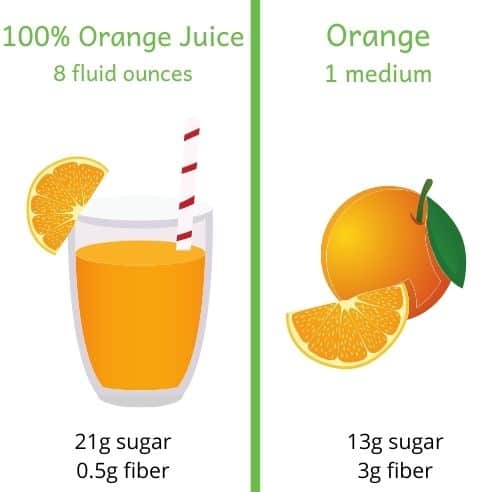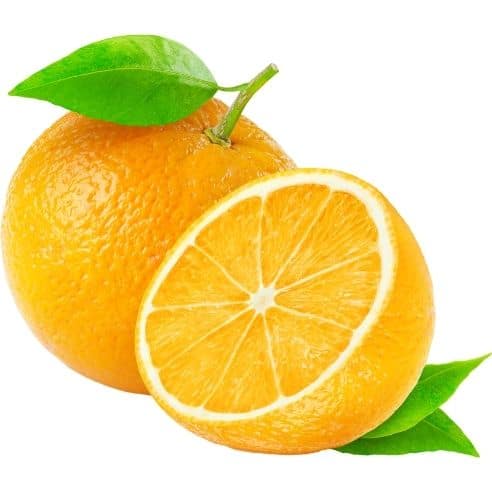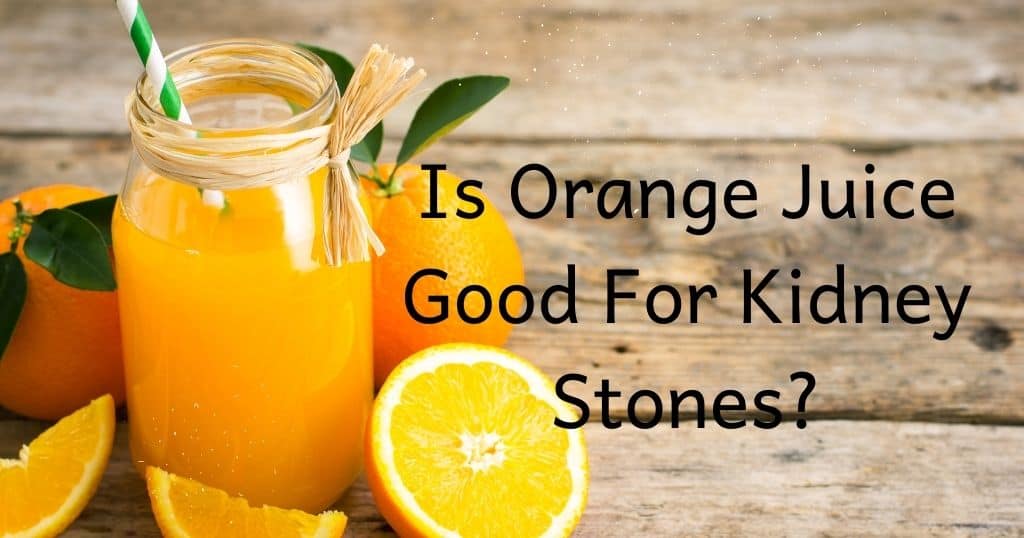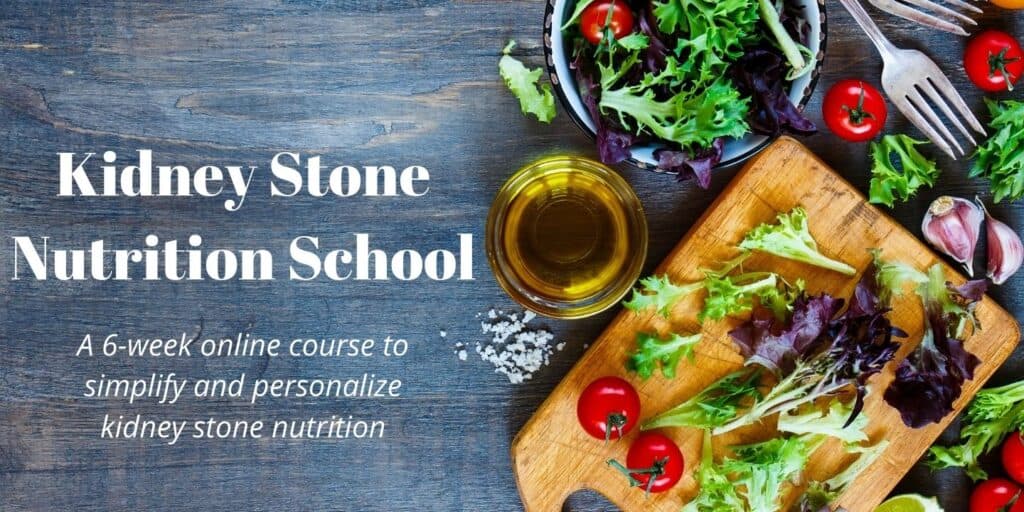Is orange juice actually good for kidney stones? Or, is this an old wives tale?
Read on to learn everything you need to know about orange juice and kidney stones.
Table of Contents
Nutritional Profile of Orange Juice

Firstly, what is in orange juice? Check out this comparison of an 8 fluid ounce glass with 1 medium orange.
| 8 Fluid Ounce Orange Juice | 1 Medium Orange | |
|---|---|---|
| Calories | 122 | 65 |
| Carbohydrate (g) | 29 | 16 |
| Sugar (g) | 21 | 13 |
| Fat (mg) | 0 | 0 |
| Protein (g) | 2 | 1 |
| Fiber (g) | 0.5 | 3 |
| Potassium (mg) | 443 | 238 |
| Phosphorus (mg) | 42 | 17 |
| Vitamin C (mg) | 84 | 63 |
| Citrate (mEq) | 35 | 15 (estimated) |
Note that orange juice is much higher in sugar, but lower in fiber. This is important to consider when asking if orange juice is good for kidney stones!
Benefits of Orange Juice for Kidney Stones
Why might we think that orange juice is good for kidney stones in the first place?
It really boils down to citrate, something called “alkali” and the fact that orange juice counts as a fluid.
Citrate
Citrate is good for kidney stone prevention. When citrate levels are high in your urine, they can help stop kidney stones from forming. (1)
Citrate is a pretty big deal. Having low levels of citrate in your urine can cause kidney stones. (2)
Citrus fruits, including oranges, are a great source of citrate.
One study found that 1.2 liters of orange juicer per day increased urine citrate from 571mg to 942mg (3). Another study found that orange juice raised urine pH and citrate more than lemonade (4). This is likely because lemonade has less actual lemon juice compared to orange juice.
Keep in mind that 1.2 liters of orange juice would add about 610 calories and 105g of sugar to your day!
Lastly, not everyone with kidney stones has low citrate levels. If the cause of your kidney stones isn’t low citrate, then adding orange juice likely isn’t going to help. A 24 hour urine test should tell you how much citrate is in your urine.
Alkali
Another beneficial aspect of orange juice for kidney stones is alkali. All fruits and vegetables produce “base” (or, “alkali”) during metabolism. Alkali reduces acid in your urine. The same study found that 1.2 liters of orange juice daily raised urine pH from 5.71 to 6.48. (3)
High urine acid (aka low urine pH) increases the risk for most types of kidney stones, including calcium oxalate and uric acid kidney stones. (5)
Fluid!
The most important thing (hands down) you can do to prevent kidney stones is drink enough fluid. Obviously, water should be a majority of your fluid. But, all fluids technically count!
In studies, consumption of most fluids is associated with a reduced risk of kidney stones including water, diet clear soda, tea, and coffee. Most people with kidney stones should drink enough to make 2 1/2 liters of urine each day. (6)
Many of my students love the Hidrate Spark* water bottle. This helps track how much water you drink, and reminds you to drink when you fall behind your goal!

Concerns About Orange Juice for Kidney Stones
Like all fruit juice, orange juice has a lot of sugar. Also, it has essentially no fiber to help reduce the spike in blood sugar and insulin as all that sugar gets absorbed.
In order to raise urine citrate or pH, you need to drink quite a bit of orange juice. The amount of orange juice used in studies adds over 100 grams of sugar. This is nearly 4x the amount of sugar most people should eat for general health.
Sugar should be limited for kidney stones too. That spike in insulin after eating a lot of sugar increases urine calcium. (7) High urine calcium is the most common cause of kidney stones. (5)
The Verdict: Is Orange Juice Good For Kidney Stones?
Ultimately, I don’t recommend orange juice for kidney stones.
The effect of drinking a reasonable amount of orange juice appears to have a neutral effect on kidney stones. One study did find a 12% reduced risk of kidney stones in people who drink orange juice. (8) However, other studies have found increased risk of kidney stones with fruit juice. (9) (10)
Although orange juice does have some benefits, the amount of orange juice you need to drink to get these benefits adds a TON of sugar. We know that sugar, especially from beverages, can actually cause kidney stones. (8) (11) (12)
You can get alkali and citrate in your diet in much healthier ways than orange juice. All fruits and vegetables (yes, literally ALL of them) will add citrate and alkali. I’d much prefer my patients get these kidney stone benefits from plenty of fruits and vegetables, rather than orange juice.
If you enjoy orange juice, it can absolutely fit in a kidney stone friendly meal pattern. I usually recommend a 4 fluid ounce portion of any type of fruit juice. Ask your dietitian what makes the most sense for you!
Are Oranges Good For Kidney Stones?
Okay, we know that orange juice isn’t ideal, but what about oranges for kidney stones?
Time and time again, studies show that people who eat more fruits and vegetables (no matter what kind!) have a lower risk of kidney stones. (13) (14)
Although oranges do have some sugar in them, the spike in blood sugar is blunted by all the fantastic fiber in oranges. Plus, the amount of sugar in an orange is much less than a typical serving of orange juice.
So, if you like oranges, they are a great fruit to eat for kidney stones! Ultimately, the amount of fruits and vegetables you eat matters a lot more than the type. Most people are nowhere near getting in enough fruits and veggies. Aim for at least 5 servings each day. Focus on eating a variety of produce to make sure you are getting all types of vitamins and minerals. Variety is the spice of life, after all!

If you are worried about oxalate with all these fruits and veggies, learn more about oxalate here!
Are Other Juices Good For Kidney Stones?
What about juices other than orange juice? Are they good for kidney stones?
Nearly all types of juice contains some citrate. Again, ALL fruits and vegetables have citrate in them.
Grapefruit juice tends to have the most citrate (65mmol/L) followed by lemon juice (48mmol/L), orange juice (47mmol/L), pineapple juice (42mmol/L), and cranberry juice (20mmol/L). (15)
However, remember that ALL juice has sugar in it without the benefit of fiber. Yes, even 100% juice! I don’t recommend any type of juice for kidney stone prevention.
However, just like orange juice, if you really like juice, it can be a part of a healthy diet. Ask your dietitian what is best for you!
Nutrition For Kidney Stone Prevention
Ultimately, there is no single food that will prevent kidney stones. Similarly, there is no single food that will cause them either!
Healthy eating for kidney stones is all about healthy eating patterns. Nutrition for kidney stone prevention is best when individualized by a Registered Dietitian to your kidney stone type and 24 hour urine results.
Learn more about how to maximize your kidney stone prevention efforts in my online course, Kidney Stone Nutrition School!
Here are some good general tips for kidney stone prevention to get you started. (6) These are also good tips for general, healthy eating!
- Drink plenty of water. Most people should aim to drink enough to make 2 1/2 liters of urine each day.
- Limit the amount of sodium in your diet. Most people should eat no more than 1,500-2,300mg of sodium per day.
- Eat plenty of fruits & veggies. Aim for at least 5 servings each day.
- Limit the amount of animal protein you eat. Especially from meats like beef, lamb, and pork.
- Make sure to eat enough calcium.
- Limit sugary drinks like soda, juice, punch, and sweet tea.
Happy Eating!
Melanie



I think you need to distinguish between various kinds of orange “juice”. There is store bought with and without added calcium, from concentrate, fresh home squeezed, home made with a “juicer”, and finally, home blended in a smoothie using whole orange slices (sometimes even including a piece of the peel for “zest”). That last option is clearly equivalent to eating oranges directly and it would therefore be just as healthy. There’s also some benefit to brands with added calcium for those on a vegan diet.
Hi John. Thank you for your comment. Even juice made at home from fresh oranges does not include fiber and has just as much sugar as store-bought orange juice without added sugar. Smoothies are a different story, as this does include the fiber.
Does a fruit salad of banana, grapes, apple, blueberries, and cherries in Greek no sugar or fat yogurt count as one serving of fruit?
Absolutely! As long as there is at least 1 cup of all of those delicious fruits in there!
What if one adds a serving of metamucil (3g fiber) to the OJ?
That certainly would add fiber! It would help, but I would still probably prefer most people eat an orange. The amount of juice and sugar you get from an orange is usually much less than an actual glass of juice. That being said, if you really love OJ, I’m sure you can make it fit in your day!
“High urine calcium is the most common cause of kidney stones” –
“ Make sure to eat enough calcium”
Saw these two statements in your orange juice post, can you clarify thanks
Hi Chris! That does seem counterintuitive, I know! But eating enough calcium is actually very important for calcium oxalate kidney stone prevention. I think this article about calcium oxalate stones and this calcium article will help clarify!
Thanks Melanie for all your wise and informative posts! I’ve learned from you that some of the foods I’ve been eating are the right ones for me all along . Also, I’ve learned from you to watch the sodium content on foods. You’ve really help clarify what has been a confusing subject to me in the past.
I’m so glad, Nancy! Thank you for taking the time to let me know.
moonstone nutrition as a great source of citrate
Hi Steve! Yep, moonstone (and some other supplements like that) are a good source of citrate. Moonstone has such a large dose, I always recommend checking with your doctor to makes sure you aren’t at risk of increasing your urine pH too high (which is also a risk factor for kidney stones).
But how about oj with alot of pulp?
Hi Ben! Good question! Even orange juice with pulp isn’t a great source of fiber.